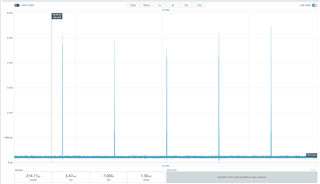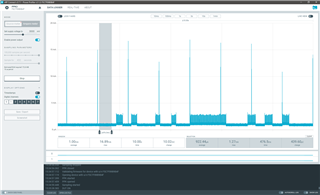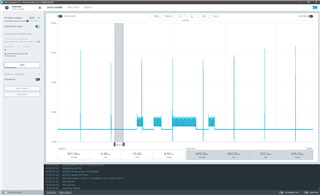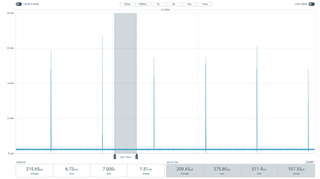Hi,
I am performing some evaluation on the low power capabilities of the nRF5340 using the DK and the PPK v1.
I have written a really basic BLE Peripheral Application based loosely around the peripheral_lbs sample code as I want to test with a button handler eventually.
The problem I have is that after considerable configuration, I can only get the current floor down to ~200uA with an average current of ~215uA with a 1.2 second advertising interval. I've seen a lot of people on here talk about seeing much, much lower currents so wondered is there a configuration that I am missing perhaps?
I have been reading the documents and a few threads on here to understand how to configure the device and I have done the following.
- My main application, running on the NS partition, has been configured as follows:
CONFIG_NCS_SAMPLES_DEFAULTS=y CONFIG_BT=y CONFIG_BT_PERIPHERAL=y CONFIG_BT_DEVICE_NAME="MH_TEST" # Enable the LBS service CONFIG_BT_LBS=y CONFIG_BT_LBS_POLL_BUTTON=y CONFIG_DK_LIBRARY=y # Drivers and peripherals CONFIG_I2C=n CONFIG_WATCHDOG=n CONFIG_GPIO=n CONFIG_PINMUX=n CONFIG_SPI=n CONFIG_SERIAL=n # Power management CONFIG_DEVICE_POWER_MANAGEMENT=y CONFIG_PM=y # Interrupts CONFIG_DYNAMIC_INTERRUPTS=n CONFIG_IRQ_OFFLOAD=n # Memory protection CONFIG_THREAD_STACK_INFO=n CONFIG_THREAD_CUSTOM_DATA=n CONFIG_FPU=n # Boot CONFIG_BOOT_BANNER=n CONFIG_BOOT_DELAY=0 # Console CONFIG_CONSOLE=n CONFIG_UART_CONSOLE=n CONFIG_STDOUT_CONSOLE=n CONFIG_PRINTK=n CONFIG_EARLY_CONSOLE=n # Build CONFIG_SIZE_OPTIMIZATIONS=y
- I have added an spm.conf
CONFIG_IS_SPM=y CONFIG_FW_INFO=y CONFIG_GPIO=y CONFIG_SERIAL=n
and added that to the CMakeLists.txtset(spm_CONF_FILE ${CMAKE_CURRENT_SOURCE_DIR}/spm.conf) - I have also configured the hci_rpmsg via the menuconfig to turn off logging
- I also tried turning on Power Management via the SPM and HCI_RPMSG's menuconfig's as well but it did not seem to have any effect.
As for my source code, I have attached it. I simply setup the BLE and handlers and then call:
for (;;) {
k_cpu_idle();
}
If we look at the PPK, I see this:

where my baseline current seems to be around 200uA - from what I had read around, I would have expected to be able to get it lower than this, so I imagine I must be configuring something incorrectly.
If you had any advice, it would be appreciated!
nRF Connect SDK: v1.6.1
/*
* Copyright (c) 2018 Nordic Semiconductor ASA
*
* SPDX-License-Identifier: LicenseRef-Nordic-5-Clause
*/
#include <zephyr/types.h>
#include <stddef.h>
#include <string.h>
#include <errno.h>
#include <sys/printk.h>
#include <sys/byteorder.h>
#include <zephyr.h>
#include <drivers/gpio.h>
#include <soc.h>
#include <bluetooth/bluetooth.h>
#include <bluetooth/hci.h>
#include <bluetooth/conn.h>
#include <bluetooth/uuid.h>
#include <bluetooth/gatt.h>
#include <bluetooth/services/lbs.h>
#include <settings/settings.h>
#include <dk_buttons_and_leds.h>
#include <device.h>
#include "power/power.h"
#define DEVICE_NAME CONFIG_BT_DEVICE_NAME
#define DEVICE_NAME_LEN (sizeof(DEVICE_NAME) - 1)
#define RUN_STATUS_LED DK_LED1
#define CON_STATUS_LED DK_LED2
#define RUN_LED_BLINK_INTERVAL 1000
#define USER_LED DK_LED3
#define USER_BUTTON DK_BTN1_MSK
#define BT_LE_ADV_CONN_TEST BT_LE_ADV_PARAM(BT_LE_ADV_OPT_CONNECTABLE, \
BT_GAP_ADV_SLOW_INT_MAX, \
BT_GAP_ADV_SLOW_INT_MAX, NULL)
const struct device *console, *uart1;
static bool app_button_state;
static const struct bt_data ad[] = {
BT_DATA_BYTES(BT_DATA_FLAGS, (BT_LE_AD_GENERAL | BT_LE_AD_NO_BREDR)),
BT_DATA(BT_DATA_NAME_COMPLETE, DEVICE_NAME, DEVICE_NAME_LEN),
};
static const struct bt_data sd[] = {
BT_DATA_BYTES(BT_DATA_UUID128_ALL, BT_UUID_LBS_VAL),
};
static void connected(struct bt_conn *conn, uint8_t err)
{
if (err) {
printk("Connection failed (err %u)\n", err);
return;
}
printk("Connected\n");
dk_set_led_on(CON_STATUS_LED);
}
static void disconnected(struct bt_conn *conn, uint8_t reason)
{
printk("Disconnected (reason %u)\n", reason);
dk_set_led_off(CON_STATUS_LED);
}
#ifdef CONFIG_BT_LBS_SECURITY_ENABLED
static void security_changed(struct bt_conn *conn, bt_security_t level,
enum bt_security_err err)
{
char addr[BT_ADDR_LE_STR_LEN];
bt_addr_le_to_str(bt_conn_get_dst(conn), addr, sizeof(addr));
if (!err) {
printk("Security changed: %s level %u\n", addr, level);
} else {
printk("Security failed: %s level %u err %d\n", addr, level,
err);
}
}
#endif
static struct bt_conn_cb conn_callbacks = {
.connected = connected,
.disconnected = disconnected,
#ifdef CONFIG_BT_LBS_SECURITY_ENABLED
.security_changed = security_changed,
#endif
};
#if defined(CONFIG_BT_LBS_SECURITY_ENABLED)
static void auth_passkey_display(struct bt_conn *conn, unsigned int passkey)
{
char addr[BT_ADDR_LE_STR_LEN];
bt_addr_le_to_str(bt_conn_get_dst(conn), addr, sizeof(addr));
printk("Passkey for %s: %06u\n", addr, passkey);
}
static void auth_cancel(struct bt_conn *conn)
{
char addr[BT_ADDR_LE_STR_LEN];
bt_addr_le_to_str(bt_conn_get_dst(conn), addr, sizeof(addr));
printk("Pairing cancelled: %s\n", addr);
}
static void pairing_confirm(struct bt_conn *conn)
{
char addr[BT_ADDR_LE_STR_LEN];
bt_addr_le_to_str(bt_conn_get_dst(conn), addr, sizeof(addr));
bt_conn_auth_pairing_confirm(conn);
printk("Pairing confirmed: %s\n", addr);
}
static void pairing_complete(struct bt_conn *conn, bool bonded)
{
char addr[BT_ADDR_LE_STR_LEN];
bt_addr_le_to_str(bt_conn_get_dst(conn), addr, sizeof(addr));
printk("Pairing completed: %s, bonded: %d\n", addr, bonded);
}
static void pairing_failed(struct bt_conn *conn, enum bt_security_err reason)
{
char addr[BT_ADDR_LE_STR_LEN];
bt_addr_le_to_str(bt_conn_get_dst(conn), addr, sizeof(addr));
printk("Pairing failed conn: %s, reason %d\n", addr, reason);
}
static struct bt_conn_auth_cb conn_auth_callbacks = {
.passkey_display = auth_passkey_display,
.cancel = auth_cancel,
.pairing_confirm = pairing_confirm,
.pairing_complete = pairing_complete,
.pairing_failed = pairing_failed
};
#else
static struct bt_conn_auth_cb conn_auth_callbacks;
#endif
static void app_led_cb(bool led_state)
{
dk_set_led(USER_LED, led_state);
}
static bool app_button_cb(void)
{
return app_button_state;
}
static struct bt_lbs_cb lbs_callbacs = {
.led_cb = app_led_cb,
.button_cb = app_button_cb,
};
static void button_changed(uint32_t button_state, uint32_t has_changed)
{
if (has_changed & USER_BUTTON) {
bt_lbs_send_button_state(button_state);
app_button_state = button_state ? true : false;
}
}
static int init_button(void)
{
int err;
err = dk_buttons_init(button_changed);
if (err) {
printk("Cannot init buttons (err: %d)\n", err);
}
return err;
}
void main(void)
{
int blink_status = 0;
int err;
printk("Starting Bluetooth Peripheral LBS example\n");
err = dk_leds_init();
if (err) {
printk("LEDs init failed (err %d)\n", err);
return;
}
err = init_button();
if (err) {
printk("Button init failed (err %d)\n", err);
return;
}
bt_conn_cb_register(&conn_callbacks);
if (IS_ENABLED(CONFIG_BT_LBS_SECURITY_ENABLED)) {
bt_conn_auth_cb_register(&conn_auth_callbacks);
}
err = bt_enable(NULL);
if (err) {
printk("Bluetooth init failed (err %d)\n", err);
return;
}
printk("Bluetooth initialized\n");
if (IS_ENABLED(CONFIG_SETTINGS)) {
settings_load();
}
err = bt_lbs_init(&lbs_callbacs);
if (err) {
printk("Failed to init LBS (err:%d)\n", err);
return;
}
err = bt_le_adv_start(BT_LE_ADV_CONN_TEST, ad, ARRAY_SIZE(ad),
sd, ARRAY_SIZE(sd));
if (err) {
printk("Advertising failed to start (err %d)\n", err);
return;
}
printk("Advertising successfully started\n");
for (;;) {
//dk_set_led(RUN_STATUS_LED, (++blink_status) % 2);
//dk_set_led(RUN_STATUS_LED, 0);
//k_sleep(K_MSEC(RUN_LED_BLINK_INTERVAL));
k_cpu_idle();
}
}





